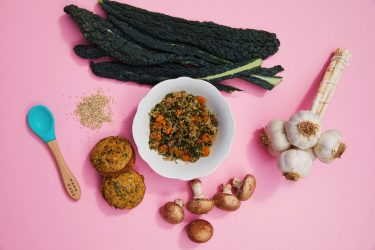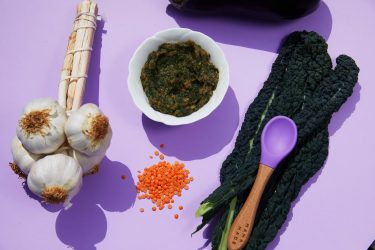Meal delivery service for infants
Posted: 26 October 2020 | Bethan Grylls (New Food) | No comments yet
Meet the entrepreneur disrupting the baby food category; New Food hears from Sophie Baron about her parent/baby digital start-up which creates bespoke nutrient-dense meals for children aged six to 36 months.


The plant-based movement has taken the world by storm, while the current covid pandemic has increased popularity food delivery services. Here, New Food interviews the Founder of Mamamade, a plant-based, meal delivery service specifically geared towards infants.
What is Mamamade?
Mamamade was founded by Sophie Baron and delivers pre-portioned and ‘measure-yourself’ pouches of organically-sourced, flash-frozen ingredients designed for babies. These are packed with a variety of nutrient-rich foods and designed to give parents the flexibility to prepare meals in minutes, while still determining what and how much their babies are eating. The format also allows babies to see and touch the foods they are eating, which is crucial for development.
Inspiration for Mamamade
As an expat in this country, Baron said she was “grossly under-supported” as a new mother and really suffered from a lack of resources.
“I found new motherhood extremely difficult and struggled to cope with all of the new demands,” she told New Food. “When I began introducing solids to my daughter, when she was around six months old, I realised just how broken the system is for modern parents. How could it be possible that the only options for busy parents like myself were either to cook everything myself, or else to rely on supermarket purees – which were highly processed and overly smooth for my daughter’s needs?”
Baron started to work on an idea that would help support parents…and Mamamade was born.
Weaning and healthy foods
The nutrition consumed by a baby in its first 1,000 days (from conception to two years old) has a lasting impact through to adulthood; deficiencies during this period can lead to ‘irreversible damage’ and can inform food choices for life, Baron explained.


“There’s a lot of pressure on new parents to get weaning right, but the good news is that the science shows that variety and persistence matter more than what you feed your baby. The wider the offering of new tastes and flavour profiles a little one can be exposed to in their first year of solids, the more confident they’ll be around foods as they grow up.”
Ingredients for infants
Mamamade is focused on providing babies with a variety of high quality, organic ingredients that are selected because of the impact they can have on a baby’s development. Ingredients such as avocado oil, which Baron says is “brilliant for brain development” and complete sources of protein like quinoa and amaranth, are amongst the meal offers. Along with a range of vegetables that many new parents “aren’t as confident cooking themselves”, such as beetroot, kale, kohlrabi and mushroom.


“Fats are one of the most important nutrients for babies to consume because their brains are developing at such a rapid rate in their first year. Beyond that, many nutrients found in fruits and vegetables actually need some fat in order to be absorbed properly. One study has shown that adding avocado oil to salad or vegetables significantly increased the body’s ability to absorb antioxidants.”
Encouraging acceptance of sophisticated flavours in infants
“Babies are so receptive to new flavours, that’s part of the fun!” Baron said. “That’s why we always encourage parents to put their own food biases to the side and create an atmosphere that is as positive and reassuring as possible. Whilst babies may pull faces at new foods, or foods with strong tastes like kale or curry, the research shows that with repeated exposure babies will accept new foods.
Infant food innovation
All of Mamamade’s recipes are created by chefs and then tweaked by nutritionists. “This way we can be sure that our meals not only taste great but are nutritionally sound for babies. It’s a really collaborative process!” said Baron.
She elaborated: “Usually a new meal idea starts either with myself or one of our chefs. There might be an ingredient we want to start ‘hero-ing’, or a flavour combination we want to try. We then work with our nutritionist to ensure the meal we dream up is a balanced, complete meal for baby. Then we try it out with some of our focus-group customers to get feedback. Then back to the kitchen for taste, and back to the nutritionist for approval.”
Infant ingredient trends
Baron said she is witnessing more parents regarding weaning as an opportunity to introduce variety to their babies’s diets and, importantly, a chance to have fun with flavour.
“We’re seeing a real readiness for introducing spice and herbs, including ‘hotter’ spices like curry and chili. We’re also frequently asked for ideas of interesting alternatives to the more usual grains, like rice, or toast toppings such as butter or avocado. Parents want to introduce more interesting flavours and it’s a thrill to be able to help them satisfy that demand in a way that takes the planning and prepping off their plate…no pun intended!”
Sourcing ingredients
Mamamade is committed to working with organic ingredients that have been tested for heavy metals and other pollutants, Baron told New Food. “This way we can be confident that they are safe for use in baby food products. We source local/British wherever possible, but the quality of the ingredient and its safety is our highest concern.


“We are all about organic food that is packed with as many nutrients and possible (IQF where possible) and sustainably sourced. We are so lucky to work with a number of suppliers who believe in what we are doing. The food we feed our children can play a big role in development and food habits, so we spend a lot of time speaking to suppliers and are constantly introducing new ingredients which may be affected by seasonality.”
The future of Mamamade
Whilst the onset of lockdown in March definitely gave Mamamade a considerable boost, with 300 percent increase in sales in one month alone, Baron is seeing sustained growth of over 20 percent month-on-month.
“We have no doubt that as parents become more time-strapped and less supported, meal delivery services will continue to surge in popularity,” she noted. “As parents become increasingly knowledgeable about nutrition and infant development, there will be a natural desire for more whole-food, real ingredients and food that can be trusted. Parents are already getting increasingly ‘adventurous’ with first tastes. Baby rice used to be the go-to for early weaning, but now parents are starting their babies off on vegetables like kale and carrot.
“Parents are also beginning to appreciate that babies have very receptive taste buds, and so we are seeing a much higher demand for big aromatic flavours and spices, like curry for example.”











